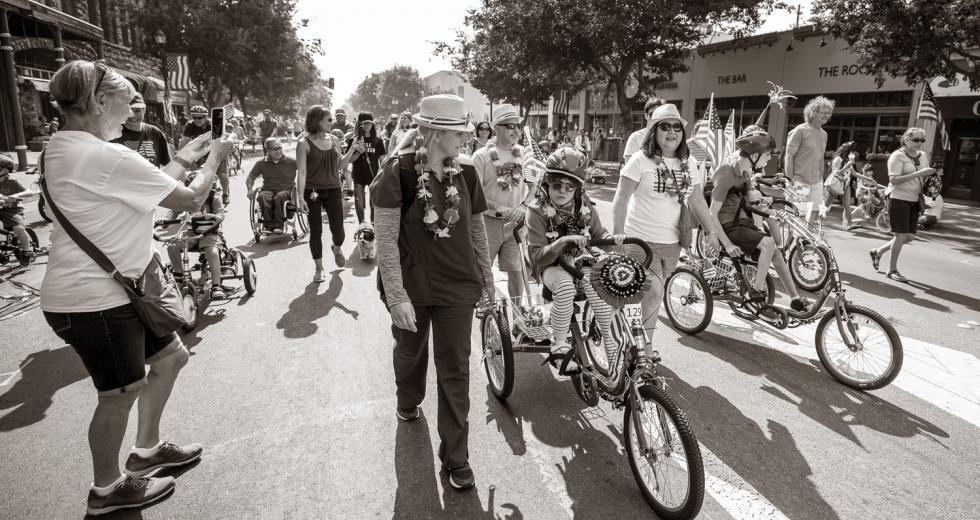Most people vividly remember their first time riding a bicycle. The sense of pride and excitement, the feeling of the sun overhead or the breeze blowing by, and hearing the cheers of a parent or sibling during those first pedal strokes. But this milestone is often missing for children with disabilities. For them, the chance to ride a tricycle can provide that special moment — and it can be life-changing, enabling a sense of mobility and personal freedom they may never have experienced before.
Gillian Williams, founder and president of NorCal Trykers, witnessed this firsthand as a physical therapist at Shriners Hospitals for Children in Sacramento. The hospital purchased 20 adaptive tricycles with a grant in 2016, each specially equipped to help children cope with various disabilities.
One of Williams’ patients at the time was a 10-year-old girl with cerebral palsy, and the first time she tried an adaptive tricycle, she walked up to it with braces on her feet and two crutches. Williams showed her how to rotate the pedals. “In a matter of minutes, I was running at her side and she was laughing and giggling,” Williams says.
“Any child can become successful, regardless of their disability.” Gillian Williams, founder and president, NorCal Trykers
Physical therapists have been using adaptive tricycles for years, according to Williams, and parents often want to know where they can buy the tricycles for their children. But at a price of at least $1,000 per tricycle, purchasing one is usually cost-prohibitive.
Inspired to help parents and bring more smiles to more children, Williams founded NorCal Trykers in 2017. The organization is dedicated to building and donating adaptive tricycles to local children with disabilities in the regional school system.
NorCal Trykers is the first Northern California chapter of AMBUCS, formerly known as American Business Clubs, which provides therapeutic tricycles to people who cannot operate traditional bikes. Through AMBUCS, Williams can choose from a catalogue of tricycles with different accessories and adaptations to build for children here in the Sacramento region.
“Any child can become successful, regardless of their disability,” Williams says.
To date, NorCal Trykers has donated 42 tricycles to local families. A combination of fundraising and volunteers makes it possible to purchase and build the adaptive tricycles.
“In our first year, we had three big building sessions where we built 10 tricycles at one time on a Saturday afternoon with a group of volunteers,” Williams says.
Until recently, Williams says it was a challenge to recruit volunteers and to find places to store the tricycles, but a NorCal Trykers board member helped establish a local partnership with the Yolo County Office of Education to support this need. Now, through YCOE’s Hecho a Mano after-school program, high school students assemble tricycles under the supervision of credentialed instructors.
Lori Perez, director of college and career readiness at YCOE, says the district was thrilled to partner with NorCal Trykers, and that the experience helps students develop empathy and do something with purpose.
“This partnership offers skill building for the students, but more than that, it’s allowing them to see that what they do has a lasting impact for kids with disabilities and their families,” Perez says.
YCOE students have built 17 tricycles this year, and their goal is to build 40 tricycles by the end of 2018.
The students and volunteers who support NorCal Trykers come together throughout the year for fundraising events and bike giveaways, where they get to witness the reactions of children receiving their own tricycles. “The experience is very touching,” Perez says.



